Content Guide
Pros and Cons of Online Learning Content Guide
- Content Guide
- Introduction
- The Pros of Online Learning
- Freedom to Choose Your Learning Environment
- Time Efficiency and Flexibility
- It Is Safer Than Commuting or Living Away From Home
- Students Learn Self-Discipline
- It Improves Virtual Communication
- Cons of Virtual Learning
- Internet Connections/Other Technical Problems
- Limited Space to Demonstrate
- Lack of Peer Interaction and Support
- You are Prone to Distractions
- No Eye Contact with Teachers
- Conclusion
Introduction
Online learning is more popular than ever and there is little wonder why.
Everyone is busy today with work and family obligations, and many people simply don’t have time to take classes and get a degree. Online schools haven’t been around that long but have exploded in popularity, especially among adults who have always wanted to attend college but who never got the chance.
If you’ve ever considered taking an online class, now is a great time to do so.
If you’re considering taking a class online but you’re debating whether it is the right move for you, it’s best to take both the pros and cons into consideration before you make your final decision.
Below are some important things to remember before you decide for sure that virtual schooling is for you.
The Pros of Online Learning
Freedom to Choose Your Learning Environment

When you choose distance learning, you can attend class anywhere you like. In fact, you can attend class sitting at the kitchen table wearing pajamas if you want to!
Distance learning is indeed versatile because you yourself create your learning environment. This makes it much more conducive to learning properly because you’ll be comfortable with your surroundings.
When people learn in a comfortable and familiar environment, they always learn more. This is one of the biggest advantages of distance learning and why so many people choose this option.
When you choose your own learning environment, it becomes a more personalized experience. This, in turn, allows you to receive the information being taught much better, increasing the odds of a good grade in the class.
Time Efficiency and Flexibility

Flexibility is the main reason why so many people choose distance learning these days. Being able to take a class when you want to and study when you want to is a huge advantage.
Furthermore, since you’re not spending so much time driving back and forth to campus, you save time. You also use your time more wisely because you are able to do so.
Of all of the advantages of an online class, flexibility is often what students love the most. You can “attend” a course in the middle of the night if you want to because the instructor doesn’t have to be there for you to learn.
These things also allow you to take a class on your own terms. This means that you will naturally become more efficient with your time due to the fact that it is so limited.
It Is Safer Than Commuting or Living Away From Home
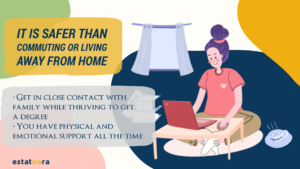
Distance learning classes mean fewer travel requirements and the ability to take a class without leaving home. There is no need to drive or live in a dorm — just turn on your computer and start learning!
This means that you’re safer with online school because you don’t have long to travel. Because of this, certain risks are reduced, including the risks associated with driving and living on campus. If you’re concerned about on-campus safety, there’s no need to worry with a distance learning class. Online schools take these risks away, and when you feel safer, you’re going to learn much more quickly.
Students Learn Self-Discipline
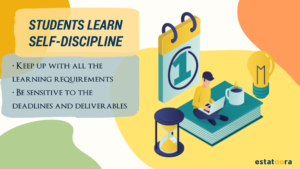
If you’re an online student, you have to have self-discipline. If you don’t have self-discipline and organizational skills, don’t worry because you will learn them quickly when you take classes from home.
In distance learning, you still have to keep up with exams, projects, and essay papers. Only this time, you’ll have to remember them on your own, which forces you to be more organized. Writing things down and checking off to-do lists will become a big part of your life. Of course, you’ll get used to it faster than you think.
In other words, don’t worry. It won’t take long for you to become more self-disciplined. After all, this is what they make day planners for!
It Improves Virtual Communication

Everyone has to learn to communicate virtually in today’s world and this is what virtual learning teaches you to do. Even sending an email to your professor can help you learn valuable communication skills.
Virtual classes also require you to write effectively and submit your papers and homework electronically. All of this means that you’ll gain experience that can help you in the real world. When you have a job, you’ll be expected to know how to write an efficient email or white paper. This is what learning virtually will help you do.
It also helps you learn how to handle social media sites because you’ll need to do your own research. Because of this, that first entry into Corporate America is a little easier on you.
Cons of Virtual Learning
Internet Connections/Other Technical Problems
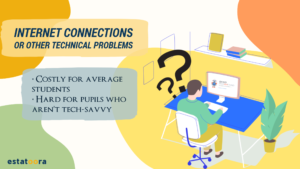
Even at work, you can experience technical and computer problems. There, however, you have an IT department to take care of all of your computer problems. When you decide on virtual classes, you don’t have that luxury. You always have to handle technical problems on your own.
This can be quite costly for the average student. If you can’t fix the problem yourself, you’ll have to call in a professional and this is sometimes very expensive.
Limited Space to Demonstrate

Most virtual students take their classes sitting on their bed or at their kitchen table. This leaves them with limited space to research, write, and do whatever else is required when you choose to get your education online.
Many things are required of students in virtual classes. Sometimes that involves projects and demonstrations, which are difficult to do if you don’t have much physical space. Even regular assignments can be a challenge when you have a virtual assignment. This is something that you’ll have to learn to get around when you’re taking virtual classes.
Getting around this limitation isn’t difficult, however. Just use a little creativity and you should be able to find something that works for you.
Lack of Peer Interaction and Support
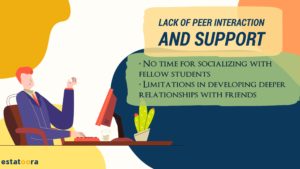
The lack of socialization and interaction with others is a big downside of virtual classes. For people who love school in part because they want to develop relationships with others, this can be downright depressing.
There are ways to overcome it, of course. This includes virtual groups associated with the classes you’re taking, which can be a big help. Other classes, however, do not offer this option, which makes it difficult for many students. If you’re a very social person, this fact can drive you crazy.
You may also lack the emotional support you need. If you run into a problem and need someone to help pick you up, a virtual class likely won’t offer that to you. In fact, when it comes to interaction and emotional support from other people, this is a huge disadvantage of taking online courses.
You are Prone to Distractions
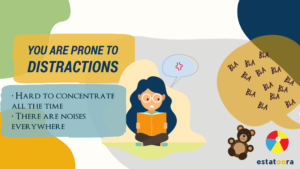
Just as with working from home, taking classes from home can be distracting. This is because that load of laundry or those dirty dishes always seem to be calling your name.
It is often difficult to concentrate on your school work when you know there are other things you need to do around the house. Regardless of how organized you are, those distractions are always going to compete for your attention.
You’ll have other distractions as well. The phone will ring, kids will ask you questions, and spouses will expect you to knock off an item or two on your to-do list.
The thing is that you’ll get used to it after a while. But in the meantime, you’ll likely have to work hard to fight off those urges to do something else besides your classwork.
This is also where your self-discipline again comes into play. If you don’t have enough of it, the distractions you encounter in the virtual classroom might be too much for you.
No Eye Contact with Teachers
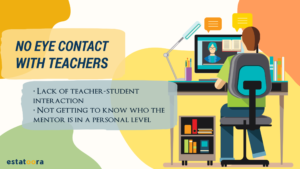
If you’re one of these students who needs a certain amount of eye contact and closeness with your professors, virtual learning can be difficult.
Having a more personal experience with your professor is not always possible with virtual classes. On the other hand, if you’re a loner and don’t want to get to know your professor, this could be a huge advantage for you.
Even with your picture and name popping up on the screen in a virtual classroom, you still might not get to know your professor in a virtual classroom. This is especially true for large college classes that have hundreds of students in them.
Conclusion
There are definite advantages and disadvantages of virtual classes but one thing never changes: if you want a good grade, you have to work at it.
Virtual classes are harder than regular classes in some ways and easier in others. And considering that the skills you learn there can easily carry over to the workforce, you should always take these classes seriously.
After all, just because the professor isn’t right in front of you keeping an eye on you the entire time doesn’t mean that you can slack off and act as though it isn’t a real class.
That’s because it is a real class. And the sooner you understand that, the better you’ll do in your virtual education.



